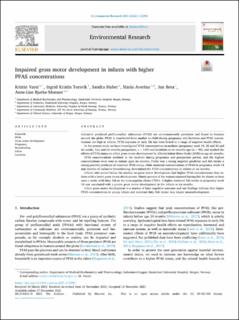| dc.contributor.author | Varsi, Kristin | |
| dc.contributor.author | Torsvik, Ingrid Kristin | |
| dc.contributor.author | Huber, Sandra | |
| dc.contributor.author | Averina, Maria | |
| dc.contributor.author | Brox, Jan | |
| dc.contributor.author | Monsen, Anne-Lise Bjørke | |
| dc.date.accessioned | 2022-02-14T12:26:41Z | |
| dc.date.available | 2022-02-14T12:26:41Z | |
| dc.date.created | 2021-12-08T23:58:29Z | |
| dc.date.issued | 2022 | |
| dc.identifier.issn | 0013-9351 | |
| dc.identifier.uri | https://hdl.handle.net/11250/2978784 | |
| dc.description.abstract | Industrial produced perfluoroalkyl substances (PFAS) are environmentally persistent and found in humans around the globe. PFAS is transferred from mother to child during pregnancy and lactation and PFAS concentrations are high in infants. PFAS exposure in early life has been linked to a range of negative health effects.
In the present study we have investigated PFAS concentrations in mothers (pregnancy week 18, 28 and 36 and six weeks, four and six months postpartum, n = 114) and in infants at six months age (n = 94), and studied the effects of PFAS status on infant gross motor development by Alberta Infant Motor Scale (AIMS) at age six months.
PFAS concentrations declined in the mothers during pregnancy and postpartum period, and the highest concentrations were seen in infants aged six months. Parity was a strong negative predictor and fish intake a strong positive predictor of maternal PFAS status, while maternal concentrations of PFAS in pregnancy week 18 and months of exclusive breastfeeding determined the PFAS concentrations in infants at six months.
Infants who scored below the median on gross motor development had higher PFAS concentrations than infants with a better gross motor development. Ninety percent of the women reported having fish for dinner at least once a week, with fatty fish as the most popular choice (72%). A higher maternal fish intake in pregnancy week 18 was associated with a poorer gross motor development in the infants at six months.
Infant gross motor development is a marker of later cognitive outcome and our findings indicate that higher PFAS concentrations in young infants and maternal fatty fish intake may impair neurodevelopment. | en_US |
| dc.language.iso | eng | en_US |
| dc.publisher | Elsevier | en_US |
| dc.rights | Attribution-NonCommercial-NoDerivatives 4.0 Internasjonal | * |
| dc.rights.uri | http://creativecommons.org/licenses/by-nc-nd/4.0/deed.no | * |
| dc.title | Impaired gross motor development in infants with higher PFAS concentrations | en_US |
| dc.type | Journal article | en_US |
| dc.type | Peer reviewed | en_US |
| dc.description.version | publishedVersion | en_US |
| dc.rights.holder | Copyright 2021 The Author(s) | en_US |
| dc.source.articlenumber | 112392 | en_US |
| cristin.ispublished | true | |
| cristin.fulltext | original | |
| cristin.qualitycode | 2 | |
| dc.identifier.doi | 10.1016/j.envres.2021.112392 | |
| dc.identifier.cristin | 1966458 | |
| dc.source.journal | Environmental Research | en_US |
| dc.identifier.citation | Environmental Research. 2022, 204, 112392. | en_US |
| dc.source.volume | 204 | en_US |

